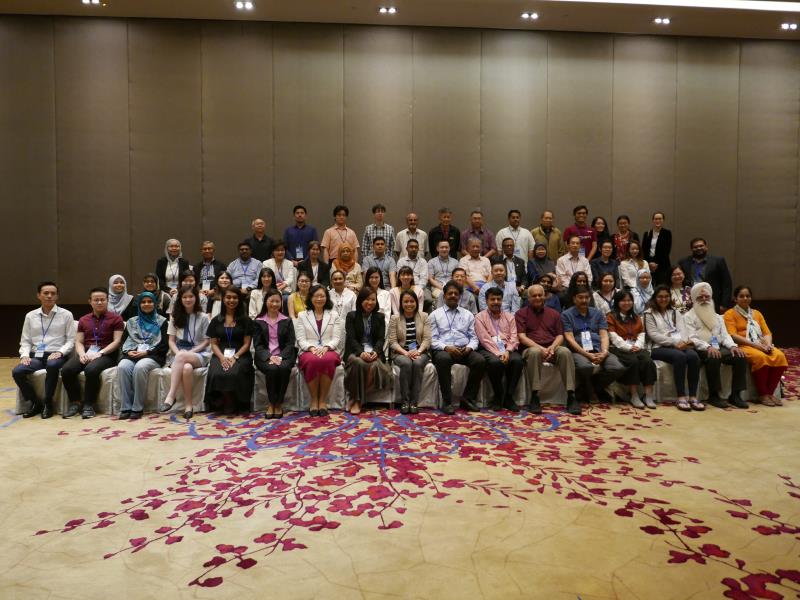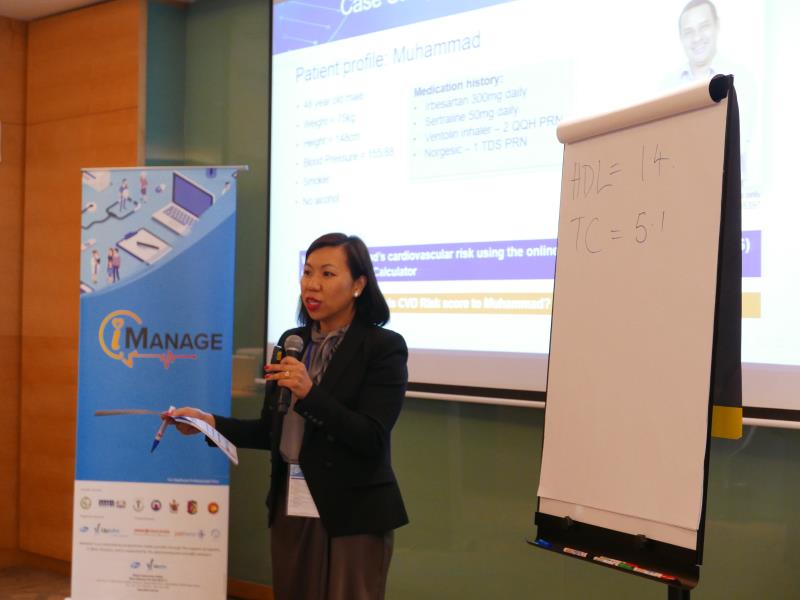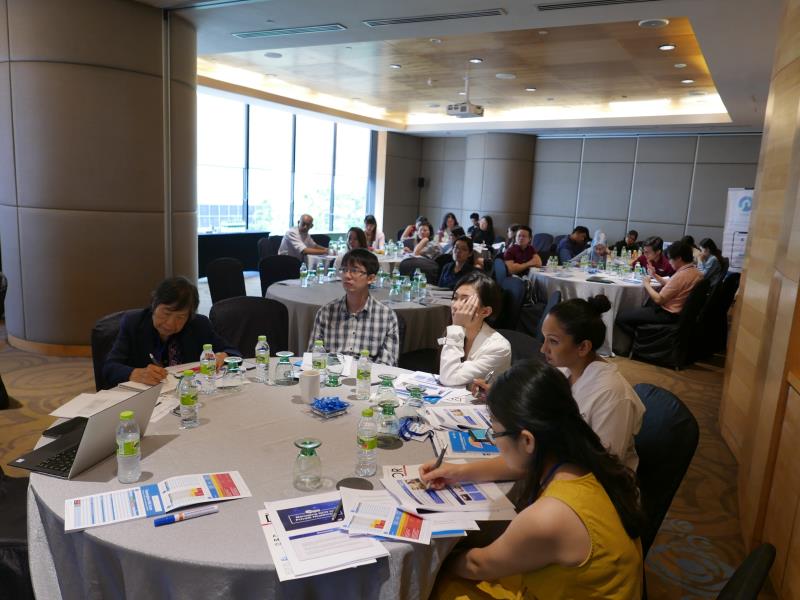 Participants and facilitators at the first iMANAGE integrated NCD management workshop series for general practitioners and pharmacists in Kuala Lumpur.
Participants and facilitators at the first iMANAGE integrated NCD management workshop series for general practitioners and pharmacists in Kuala Lumpur.From September to November 2019, the iMANAGE (Integrated Management of Non-Communicable Diseases in Non-Governmental Establishments) programme conducted a three-part workshop series in Kuala Lumpur for Klang Valley general practitioners and pharmacists working in the private sector.
With an initial focus on three primary areas of disease—pain management, mental health, and cardiovascular disease (CVD)—the pharmacists’ workshops conducted participants through disease epidemiology, physiology, and means of disease assessment available at the pharmacy, as well as pharmacological and non-pharmacological approaches to treatment.
Interactive discussions and facilitated roleplay scenarios helped to illustrate practical applications for patient assessment tools and algorithms, with an emphasis on helping patients understand and set realistic expectations and goals for their own treatment.
Participants were also guided through recommended means of providing structured referrals to GPs and medical specialists for their patients in the absence of nationally established protocols.
iMANAGE is a recently initiated collaboration between Upjohn, a division of Pfizer, and seven Malaysian healthcare associations including the Academy of Family Physicians of Malaysia (AFPM), Malaysian Association for the Study of Pain (MASP), Malaysian Medical Association (MMA), Malaysian Pharmaceutical Society (MPS), Malaysian Psychiatric Association (MPA), Malaysian Society of Hypertension (MSH), and National Heart Association of Malaysia (NHAM).
According to Dr Gayatri Gunasagaran, country medical lead, Upjohn Malaysia, the core aim of the iMANAGE programme is to bring together healthcare professionals (HCPs) from different areas to provide structured, standardized, and integrated care for patients with NCDs.
“What we’re doing is looking at how we can play a more impactful role in managing NCDs. In a country with a high NCD disease burden … our health system is extensive enough that there’s no point working in silos,” said Gayatri. “What we want to create is a platform for education and networking which helps private HCPs work together as a team to manage patients.”
 Joyce McSwan, clinical pharmacist, guides iMANAGE pharmacists’ workshop participants through a CVD risk assessment exercise using the Framingham Risk Score.
Joyce McSwan, clinical pharmacist, guides iMANAGE pharmacists’ workshop participants through a CVD risk assessment exercise using the Framingham Risk Score.The 2019 workshop series was structured in partnership with WISE Programs Australia, as well as with the support of health coaching organization Naluri, and MIMS Education. The pharmacists’ workshops were conducted by Joyce McSwan, clinical pharmacist and PainWISE managing director, with the assistance of Dr Mary Cardosa, MASP president, for the area of pain management; Dr Hazli Zakaria, MPA president, for mental health; and Dr Rafidah Abu Bakar, consultant cardiologist at the National Health Institute (IJN), for CVD.
As part of the overall iMANAGE programme, participants in the workshops were also enrolled in a study to examine the efficacy of the integrated training module in improving patient engagement at their respective places of practice.
Points of opportunistic NCD risk screening
Speaking at the CVD workshop, Rafidah encouraged pharmacists to take an active role in promoting health screening, particularly for customers that might appear to be at increased risk of NCDs.
“Patients only come to specialists like us when they have a huge problem; most of them go to the pharmacy on a day-to-day basis. When they come, and you see that they might be slightly overweight, that’s a chance to offer to check their weight, their blood pressure, and other basic parameters,” said Rafidah. “As pharmacists and frontliners, your help is needed for early detection and management … the majority of our local population doesn’t have a designated point of care for regular health screenings, and many do not go for them of their own accord.”
The role of continuity beyond clinics
Participants in the workshops also received two complementary 6-month subscriptions to Naluri’s mobile health coaching services, which could be issued to two patients of their choosing, based on the HCP’s assessment of their treatment needs.
According to Tiffanie Ong, Naluri chief operations officer, lifestyle modifications could be twice as effective as pharmacological treatments in reducing an individual’s NCD risk. She cited a 2002 study in the US which showed lifestyle changes generated a greater risk reduction (58%) versus oral medications (31%) in prediabetic adults. [N Engl J Med 2002;346:393–403]
Ong promoted the Naluri mobile app as an affordable and effective means for patients with NCDs or at risk of them to access trained digital coaching in affecting necessary lifestyle changes, with features such as personalized interaction with healthcare professionals, food journaling, daily education modules, planners, and cognitive behavioural therapy tools.
 Participants at the iMANAGE pharmacists’ workshop receive training in NCD management practices applicable in the community pharmacy.
Participants at the iMANAGE pharmacists’ workshop receive training in NCD management practices applicable in the community pharmacy.Patient communication, collaboration with doctors needed
Speaking at the closing session of the workshop series, Datin Mariani Ahmad Nizaruddin, MPS vice president, emphasized the role of the pharmacist in improving patient’s understanding of their treatment regimens.
“Coming from primary care, we know Malaysians have compliance issues; they know their medications are important, but not why they need to be taken, especially when—as is usually the case with CVD and other NCDs—polypharmacy is involved,” said Mariani. “It’s our job to break confusing medical jargon down for them.”
Mariani also highlighted the need for more collaboration between pharmacists and doctors in sharing patient information, noting that some patients were more willing to come to pharmacists asking for products that could help with apparently mild symptoms rather than going to a doctor.
“Patient interventions are difficult if we don’t communicate with our local physicians. We as community pharmacists have to provide some kind of intermediary role to communicate concerns on our patients’ behalf,” said Mariani. However, she acknowledged that the question of patient information could be sensitive ground, with pharmacists without legal rights to obtaining a patients’ full medical history under current Malaysian law.
Future directions
Various participants at the iMANAGE workshops expressed an appreciation for the training and resources provided, as well as hopes for future iterations of the programme expanding to other disease areas.
“Overall, the workshops have been really helpful in terms of refreshing background knowledge on the NCDs, and also practical aspects for my own use,” said D. A., a community pharmacist among the workshop participants. “I feel like I can definitely apply elements from the workshops in my practice, especially things like CVD risk assessment algorithms.”
Another anonymous participant, an older community pharmacist in management and training, noted that the workshops were useful regardless of levels of experience.
“One thing emphasized was patient communication. A lot of refresher courses cover technical aspects easily, but when it comes to counselling, many pharmacists still lack the skills needed,” she said. “Most times we’re trained to give a lot of information, but we don’t listen very well. Every intervention needs to be seen from the patient’s point of view, because healthcare is about them, not us.”
While participation in iMANAGE in its pilot stage is currently limited to HCPs in the Klang Valley, successful outcomes could lead to the programme being rolled out to other parts of Malaysia where patient health literacy is still in need of improvement, according to McSwan. She added that in early 2020, there would be facilitated small group roundtables with specialists, as well as a workshop to summarize the three modules presented this year.